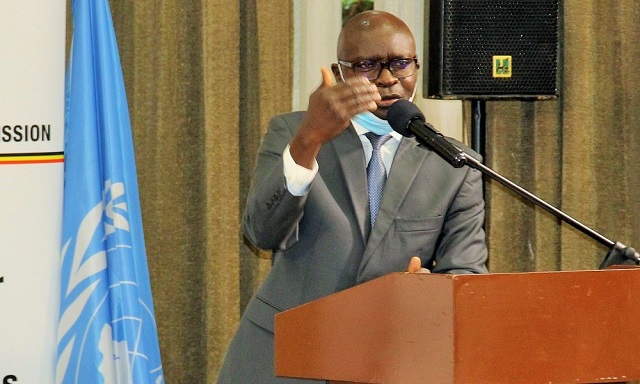
Justice Byabakama says High Court is capable of handling the parliamentary election petitions and that there is no need to set up tribunals
Kampala, Uganda | THE INDEPENDENT | The Electoral Commission (EC) has rejected proposals under the Constitutional Amendment Bill, 2020 which seeks to change the process of handling parliamentary election petitions.
On Wednesday, the Electoral Commission chairman Justice Simon Byabakama, and other commissioners appeared before the Legal and Parliamentary Affairs Committee to provide an opinion on the Bill tabled by Jinja Municipality East MP Paul Mwiru.
Mwiru says that the current petition handling process is time-consuming and costly for aggrieved people involved in litigation.
In his Bill, the MP seeks the establishment of Election Petition Tribunals to hear and determine whether a person has been validly elected a Member of Parliament, Speaker or Deputy Speaker.
According to Mwiru, the Tribunal should be appointed by the Chief Justice and the members should include Justices of the Supreme Court, the Court of Appeal and Judges of the High Court.
According to the Bill, the Tribunal’s decision shall be final and not subject to any appeal. Mwiru suggests that the determination of petitions and declaring of findings must be not later than 45 days from the date of filing the petition.
“The Tribunal may give summary judgement pending full judgement that shall be delivered within six months from the date of delivery of the summary judgement. Each member of the Tribunal shall be required to produce an independent judgement,” further reads the Bill.
MP Mwiru also proposes that where an election petition has been filed, a person against whom it is filed should not be gazetted for purposes of being sworn in as a Member of Parliament until the petition is disposed off. He also wants Article 81(2) of the Constitution amended to reduce the number of days within which a by-election shall be organized after a seat for MP is declared vacant from 60 to 30 days.
Responding to the proposals, EC chairman Justice Simon Byabakama said the setting up of election petition tribunals was not necessary.
“In the current framework, we have the forum to which any aggrieved party or individual who qualifies under the law to file a petition can go to express his or her dissatisfaction with the outcome of an election,” said Byabakama.
He says that the High Court is capable of handling the parliamentary election petitions and that there is no need to set up tribunals.
Byabakama further said that the proposal infringes on the right to a fair hearing and the right to appeal.
“The Commission may be a party to a matter in respect of election petition and should be accorded recourse to appellate jurisdiction. Tribunals exercise quasi-judicial powers and their findings are subject to review by a competent court of judicature,” he added.
Byabakama also says that the proposed tribunal also leaves out aggrieved persons in Local Government elections which are also challenged in the High Court.
Regarding concerns that election petitions take long to be resolved, Byabakama said that Parliament should handle the matter with Judiciary leaders.
EC officials also raised concern over the proposed reduction of time within which a by-election can be held saying that the suggested 30 days would be difficult to organize an electoral exercise. Byabakama said that the current 60 days is sufficient for them to carry out planning, mobilization of resources, procurement, the printing of ballots and other activities.
Jacob Oboth, the Legal and Parliamentary Affairs Committee chairperson said that they would interest with Judiciary officials on how election petitions can be expeditiously handled.
Decisions on election petitions have sometimes taken more than a year. At least six election petitions from the 2016 general election have not been disposed off by the Court of Appeal about one month to the start of a new Parliament.
*****
URN
 The Independent Uganda: You get the Truth we Pay the Price
The Independent Uganda: You get the Truth we Pay the Price



